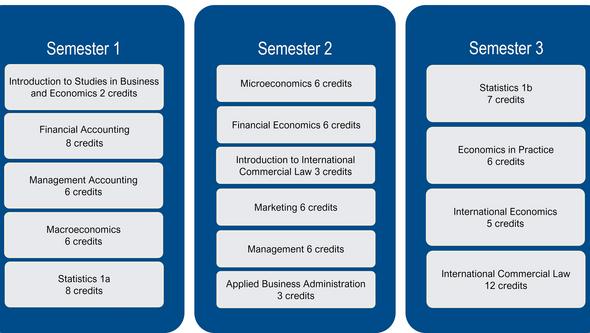Bachelor's Programme in Business and Economics: Courses and choices
The Bachelor’s Programme in Business and Economics, commencing in the autumn semester, consists of 180 credits which equates to three years of full-time study. Here you can find more specific information about the courses and the possibilities for specialisation currently offered.
To the programme page for Bachelor's Programme in Business and Economics
The programme is aimed for students who have not studied at university level before. If you have previously studied business and/or economics at undergraduate level and still wish to join this programme, please check the information provided at the end of this page.
First phase semesters 1-3: Core courses
During the first three semesters of the programme, you will be focusing on the foundations of business administration, economics, statistics and commercial law. The courses are given in a sequence that allows for a more interdisciplinary understanding of economic agents, their actions and the world that surrounds them.
This introduction provides you with the theoretical and methodological foundations for a broad understanding of the economy and economic thinking. The courses are taught only within the programme and are connected across subject boundaries.

Teaching
During the first two semesters, you study courses at a fast pace with a comparatively high proportion of timetabled teaching and many examinations. The teaching consists of lectures, exercises, and seminars. In some courses you will be part of a group, collaborating to solve assignments and presenting the results of your work together. In other courses, you will focus on the process of information gathering and methods, preparing for an exam on theoretical principles at the end of the course. Your first year culminates in an intense business simulation exercise during which you will be given the opportunity to apply your previously acquired knowledge from your courses in business administration.
During the following third semester, there will be a greater requirement for in-depth analytical skills. Both the teaching and examinations are conducted in the form of seminars or exercises during which you discuss the subject independently, either orally or in writing. You will attend a course in economics where you will be asked to address sustainability-related issues from the foundation of knowledge you have acquired during an earlier stage of your education. In the course commercial law, practical application is the focus, and the examination largely consists of written essays and seminars.
Select your main field of study
In the third semester, you will also arrive at the point of selecting your main field of study; the subject area you will be majoring in. Business administration, economics or financial economics are the three majors to choose from, and in this phase of the programme you have experience in all of them.
Before the decision must be taken, you can attend inspirational events where you meet alumni students who graduated from the different fields of study. Learning from alumni will give you a better appreciation of how your individual choice may suit your plans for a future career.
Note that most similar programmes in Sweden are specialised and do not offer a choice of major.
Second phase semesters 4-6: Chosen major
From the fourth semester you will study courses in your chosen main field of study (major): business administration, economics or financial economics.
In the beginning of semester 4 you have the possibility to apply for exchange studies at one of our partner universities which gives you the opportunity to study abroad during semester 5. If you are majoring in business administration or economics, you have few limitations in course selection during your fifth semester. If majoring in financial economics, you must keep studying within your major.
Bachelor thesis
Irrespective of the major you have chosen, you will finalise the programme by writing a bachelor’s thesis together with one other student, guided by a supervisor. The bachelor’s thesis is a small-scale research project where you are offered an opportunity to develop your expertise in your main field of studies. You are expected to define your own research questions and to report the results of your own scientific study. The bachelor’s thesis concludes your education and serves as a bridge to further studies at advanced level or your entry ticket to a first job after graduation.
Main field of study
Extracurricular diploma track
If you wish to immerse yourself further in personal and professional development, there is also an extracurricular diploma track running parallel to your studies.
This track is offered by the programme in close cooperation with Career Services at the School. Participation in the diploma track strengthens your skills in areas often requested by future employers; for example, planning skills and self-leadership.
Previous experience of studying business and economics?
In comparision with most other universities in Sweden, the School of Business, Economics and Law offers a different course structure at the basic level (three first semesters). This means that you will probably have some gaps in your studies when you seek to transfer credits from previously completed courses in other Universities to complete a degree at the School of Business, Economics and Law.
Furthermore, The Bachelor's Programme in Business and Economics cointains learning goals which are specific to the programme. This means that you may not beable to include all your higher education credits when applying for your bachelor's degree at the School of Business, Economics and Law.
For your completed courses to be transferred, you must be admitted to the programme. There is no possibility to a later part of the programme since there is no such option offered.
If you plan to commence this programme and wish to transfer previously completed courses, please contact our study counsellor for support.